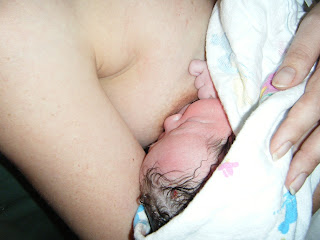This is my very first guest post ever! Please welcome Olivia from Write About Birth. Read to the bottom for her bio. Today I share with you Olivia's thoughts on unassisted childbirth, not a question of simply following your instincts.
“Trust birth" and “listen to your intuition” are among the most commonly heard statements among families who chose an unassisted homebirth; a birth without the presence of medical professionals. Is having faith that a woman’s body will simply birth her baby as long as her birth is unhindered by others, and she follows her instincts, really the alternative to delivering in a medical setting with all the possible interventions, and often against the medical interest of both mother and baby?
As a woman who had two homebirths, one of which was unassisted, I do not believe in the mantra of “trusting birth”, though I fully support the sense of listening to intuition. After all, intuition is simply a very fast cognitive process that is often much more effective than conscious logic. I chose to give birth to my second child alone, without medical professionals or anyone else, for many reasons.
I chose unassisted homebirth both for what it would offer me and my baby, and for what we would avoid by staying at home. What UC offered me was an unhindered birth free of fear; a labor during which I felt safe and comfortable. It offered a calm and peaceful entrance into the world to my son. And staying at home helped us avoid the medieval maternity system in the developing country we reside in, a maternity system that offers dangers far beyond inducing labor or hooking mothers up to a fetal monitor. Among the issues that mothers in my Eastern European country of residence face are babies “disappearing” to illegal adoptions and women being refused access to medical care because they were neglectful enough not to bribe a doctor in advance.
Unassisted childbirth is a fringe choice, and certainly a controversial one. It is also a valid choice for many women. As adults, we have the right and usually the ability to be autonomous, and to decide for ourselves and on our child’s behalf how we give birth.
Personally, I believe it is in the best interest of every pregnant woman and her baby if the mother researches pregnancy, birth, and their possible complications, in as many detail as possible, regardless of whether they are planning a hospital birth, a homebirth assisted by a midwife, or a freebirth. Looking at the risks and advantages of each birth setting gives us more power to ultimately know what choice is the right one for us. Risks exist for everyone, but the same risks do not apply to every pregnancy, every baby, and every mother.
While I support the right of women to rely solely on their intuition, their body, or the guidance of God, it is also important to remember that complications during birth are indeed very possible. The view that many childbirth complications are caused by medical systems is legitimate. I hold this view, too. But complications can and do come up in homebirth settings, and the notion that most serious complications require prompt actions and often medical care from professionals is hard to dispute.
Placental abruption, cord prolapse, shoulder dystocia and uterine infections are all complications that require knowledge to deal with. Often, when symptoms show up, heading for a hospital is a good course of action. In other cases, labors can take a different turn to the expected smooth birth, and can take a long time to complete. Recently, an online friend who had planned a freebirth headed to the hospital and had a c-section because her long labor did not result in the baby descending and her contractions petered out. The cause? Uterine fibroids, apparently!
Do all these possibilities mean that unassisted childbirth is a bad idea, period? That is not the conclusion I drew. The woman I mentioned, Issa (of LoveLiveGrow.com), a first-time mother, researched birth in depth before and throughout her pregnancy. She had a lot of knowledge, but ultimately it was still her intuition that led her to seek outside help. If her knowledge and her intuition had told her otherwise, she would have opted to stay home.
Learning about complications and how they can be dealt with in both home and hospital settings sets women up for a safer birth – and a more relaxed birth too, since having the knowledge that your birth is proceeding smoothly certainly puts you at ease.
Learning about the physiology of birth and the possible complications and variables, as much as possible, as well as trusting that in the majority of births, everything will be fine, are fully compatible actions. Trusting your intuition, knowing that most babies are born safely and smoothly, and also knowing how to act if this does not happen for you is not contradictory. You can enjoy your birth while also taking note of every sensation you feel, and even while evaluating whether everything is normal. Knowledge is power, and perhaps that is never more true than during labor and birth.
 Olivia of WriteAboutBirth.com Olivia of WriteAboutBirth.com |
Olivia is a journalist and solo mom of two great kids. She is unconventional. She is a homebirther who tried both a midwife-attended birth and an unassisted birth. She tries to be a gentle mama, but confesses to having a bit of a temper. Basically, she is just your typical crunchy mom. Her blog, Write About Birth, is about birth and all things related. I've learned a lot there. That seems like a big statement considering I've already had 3 natural births!
Olivia's site also recently hosted a guest post from me! (You may recall I posted about it earlier in the week.) If you haven't checked it out yet, please go see me on her site! Birth: How time changes perspectives and desires
